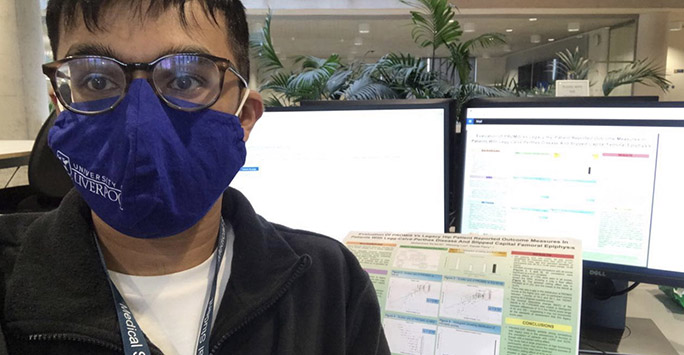
Student doctor Mohammed Ali presented the winning poster at the recent Orthopaedics: Home and Abroad virtual conference by the Liverpool Trauma and Orthopaedics Society. He shares more about his work on paediatric orthopaedics that secured him the win, as well as his top tips for students interested in research.
Perthes’ disease is a childhood hip disease; where avascular necrosis of the femoral head causes changes to the shape of the hip and joint congruency. This can cause pain, reduced hip function, and the development of early osteoarthritis. Historically, Perthes’ disease does not have much robust evidence behind its interventions, when compared to other orthopaedic conditions.
I met my supervisor, Professor Daniel Perry, on Zoom for the whole of my first term – the entirety of my first project. I was analysing how patients with Perthes had rated their hip function, and pain level through different scoring tools to find out which score would be the best for rating Perthes’ disease. After writing it up, I produced a poster for the research, and submitted it to the conference after noticing the work suited the conference theme. To my surprise, it became the winning submission!
Researching in medicine is what pushes the frontier forward, but it can seem intimidating, or even dull to get into as a student doctor.
I think there are a few reasons for this.
- A lot of research is set in a particular style of scientific writing which is unfamiliar and sometimes at first, difficult to read. This is especially the case coming into medical school from a non-research-literate background - most of us!
- It can take time to understand a project and how best to go about it.
- Research can often feel very lab or data/computer based, which isn’t immediately as colourful or as interesting as the clinical learning most expect from studying medicine.
Despite this, there are many reasons to get involved. Here are some tips to do so:
- Try your best to find a project you know you’ll be interested in/will commit to. Even if you’re given a particular project – taking the time to understand it as best as you can before working on it can often make it more enjoyable.
- Whilst working on your project, read similar papers on the same topic for inspiration on how to structure your project, as well as the general language of the research.
- Ask doctors/professors who work in areas you’re interested in about their research, and how you can get involved if you’d like to.
- Don’t be afraid to ask lots of questions.
Researching is great for lots of reasons.
You can really understand a particular area of a specialty, and learn lots of useful skills for your future career as a doctor.
Working with good mentors, supervisors, and in multi-disciplinary teams presents lots of useful opportunities for your future career, as well as useful career advice. For most specialty applications, having produced or published some research work is a great boost for a CV, and a way to distinguish yourself.
With most specialties, the research can be with any specialty and does not have to be specific to the specialty you’re applying for – aka it’s still worth points in the application process!
Ultimately, the coolest thing is that research is what brings the frontier of medicine forward. Meaning we can better look after patients, treat conditions previously thought to be difficult to treat, and improve people’s lives in a more impactful way - with every successive generation of doctors and scientists!
Mohammed Ali is currently completing an intercalated Master of Research in Translational Medicine. He is also involved in the COVID-19 vaccination programme along with other students from Liverpool School of Medicine. Thanks for sharing your story and advice Mohammed!